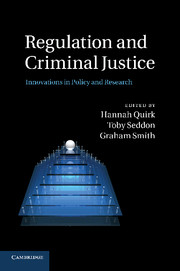Book contents
- Frontmatter
- Contents
- List of figures and tables
- Notes on contributors
- Foreword
- Acknowledgements
- 1 Regulation and criminal justice: exploring the connections and disconnections
- PART I Regulation and criminal justice: framing the debate
- PART II Criminal justice as regulation: responsivity, alternatives and expansion
- PART III Regulation of criminal justice: monitoring, effectiveness and accountability
- Index
Foreword
Published online by Cambridge University Press: 04 February 2011
- Frontmatter
- Contents
- List of figures and tables
- Notes on contributors
- Foreword
- Acknowledgements
- 1 Regulation and criminal justice: exploring the connections and disconnections
- PART I Regulation and criminal justice: framing the debate
- PART II Criminal justice as regulation: responsivity, alternatives and expansion
- PART III Regulation of criminal justice: monitoring, effectiveness and accountability
- Index
Summary
Whatever the upshot of enquiries into the legality of the invasion of Iraq in 2003, we can feel confident that criminal justice journals will not be full of articles that argue ‘if it was right to convict Prime Minister Tojo and his cabinet for crimes of aggression, should not western cabinet ministers hear the clang of the jailhouse door over Iraq?’ We might excuse US journals for not being engaged with such a debate because the US does not acknowledge the jurisdiction of international criminal law over its leaders. We know this will not happen anywhere for Iraq because journals concerned with crime have never engaged in any major way with such debates when past leaders were Anglo-Saxon, or friends of the dominant western powers. We can have a debate over whether President Saddam Hussein should hang for crimes against the Kurds once he is a pariah in the west, but it is not a question worth discussing among criminologists when he is an ally during the period when he actually commits the crimes. Criminology can have a debate over whether Pol Pot and his communist Cambodian leadership should have been convicted, but not over whether President Suharto should have been convicted for the slaughter of half a million Indonesian communists, or for the invasion of West Papua or the invasion of East Timor.
- Type
- Chapter
- Information
- Regulation and Criminal JusticeInnovations in Policy and Research, pp. xiii - xviiiPublisher: Cambridge University PressPrint publication year: 2010



